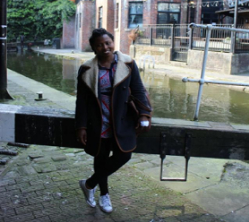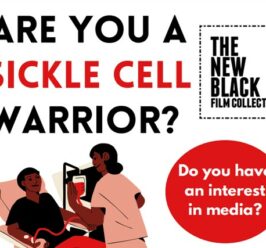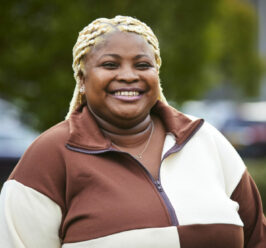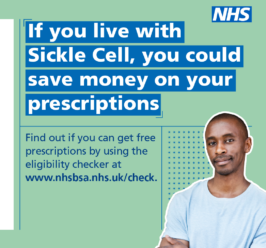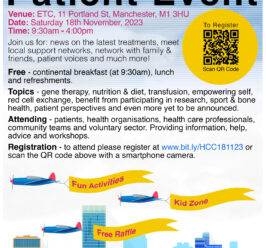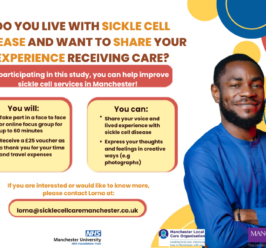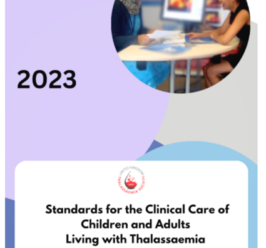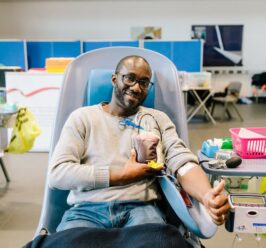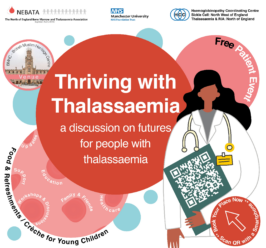It is vital for patients and carers to be well informed about the condition. The HCC promotes improved self-care to enhance quality of life and reduce the need for admission into hospital.
Introduction
What is Sickle Cell?
Sickle cell is a genetic blood disorder effecting the shape of haemoglobin in the red blood cells. Haemoglobin is the substance in red blood cells that is responsible for carrying oxygen around the body. People with sickle cell disorder are born with the condition – it is not contagious.
The main symptoms of sickle cell disorder are anaemia and episodes of severe pain. The pain occurs when the cells change shape after oxygen has been released. The red blood cells then stick together, causing blockages in the small blood vessels. These painful episodes are referred to as sickle cell crisis. They are treated with strong painkillers such as morphine to control the pain. People with sickle cell are at risk of complications stroke, acute chest syndrome, blindness, bone damage and priapism. Over time people with sickle cell can experience damage to organs such as the liver, kidney, lungs, heart and spleen. Death can also result from complications of the disorder.
Treatment of sickle cell mostly focuses on preventing and treating complications. Research into the treatment of sickle cell has intensified over the past decade. Clinical trials are held nationwide, and any new NHS treatments await scrutiny and approval from the National Institute for Health and Care Excellence (NICE.)
To find out more about sickle cell click here
What is Thalassaemia?
Thalassaemia is a genetic blood disorders affecting the production of haemoglobin. People with thalassaemia produce either no or too little haemoglobin. Haemoglobin is an iron-rich protein in red blood cells that carries oxygen to all parts of the body.
Thalassaemia is inherited from parents, it is not contagious, or a virus acquired from blood transfusions. It is passed on equally by men and women.
The main health conditions associated with thalassaemia are:
- Anaemia – severe tiredness, weakness, shortness of breath, pounding, fluttering or irregular heartbeats (palpitations) and pale skin caused by the lack of haemoglobin
- Too much iron in the body – this is caused by the regular blood transfusions used to treat anaemia and can cause problems with the heart, liver and hormone levels if untreated
Some people may also have delayed growth, weak and fragile bones (osteoporosis), and reduced fertility.
To find out more about thalassaemia click here
UK Thalassaemia Society (UKTS) is a thalassaemia patient support and advocacy group – to find out more click here
What are Rare Inherited Anaemias?
Rare Inherited Anaemias (RIA) are rare genetic blood disorders. Examples of RIAs are as follows:
• Diamond-Blackfan Anaemia – a rare blood condition where the bone marrow fails to produce enough red blood cells.
• Congenital Dyserythropoietic Anaemia – an inherited blood disorder that affects the development of red blood cells.
• Congenital sideroblastic Anaemia – an uncommon, diverse class of inherited hematopoietic disorders. In which the bone marrow fails to produce a sufficient number of healthy red blood cells.
• Red cell Membrane disorders
• Red Cell Enzyme disorders
• Transfusion-dependent unexplained inherited anaemias
As these types of anaemias are rare, research into the conditions continue. To find out more about RIA click here
New Treatments
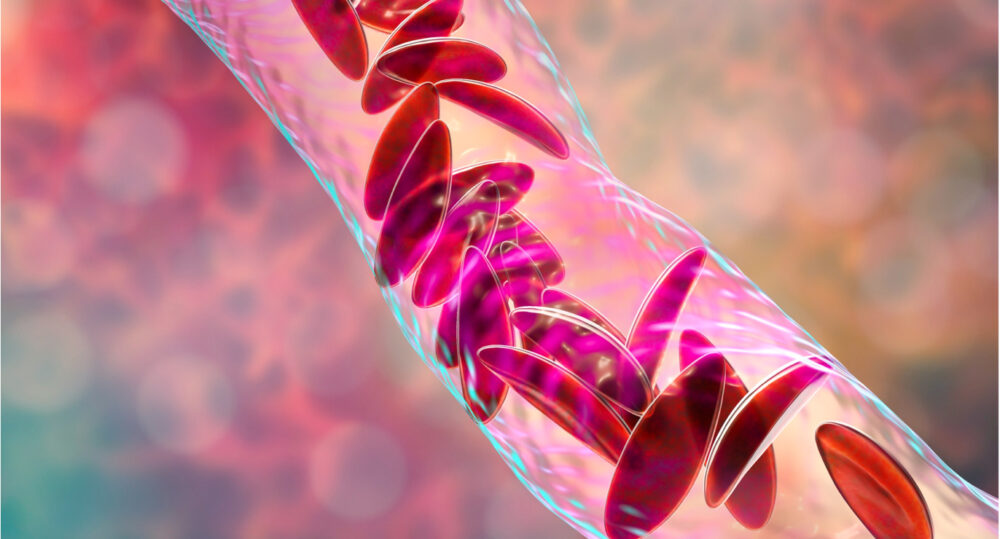
The future of sickle cell treatment – Dr Sharif
Dr Sharif, Consultant Haematologist at Manchester Royal Infirmary, provided a presentation regarding the future of sickle cell treatment at the HCC NW Sickle Cell Engagement Event in November 2022.
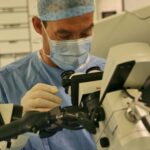
Clinical Trials
There are a number of clinical trials across the UK. Head to our research page to find out what is available in North England.
Holistic Care & Benefits
Our mission: to engage patients, parents, carers, using an integrative holistic system of resources and programming that maximise health and well-being.
What is Holistic Care all about?
• Making healthy lifestyle choices
• Taking responsibility for your health
• Getting preventive care examinations and vaccinations
• Knowing when to see a healthcare provider
• Knowing when to get emergency care
As a sickle cell, thalassemia, or Rare Inherited Anaemia patient, you should have access to a variety of health, wellness, and social care resources to form a network of self-care.
The HCC Administration Team are working with health care professionals, patient representatives and other stakeholders to provide information regarding healthy habits, a healthy mind, medical care, social networks, work life, social care support, and media.
Healthy Minds
Kooth and Qwell are both online counselling and emotional well-being services for children, young people, and adults – available free at the point of access.
The services are:
- Safe, confidential, anonymous
- Free at the point of need
- Available through a smart phone, tablet or computer
- Kooth & Qwell helps to reduce wait times for people seeking help and removes stigma around mental health. It allows people access to a team of accredited counsellors, therapists and support workers who provide guided, outcome-focused help for everyone.
The organisation works with local authorities, CCGs, mental health trusts, charities and other organisations to provide early intervention support with clear escalation and de-escalation pathways.
Click on the following links to understand how it works:
Healthy Minds
 In this section
In this section
